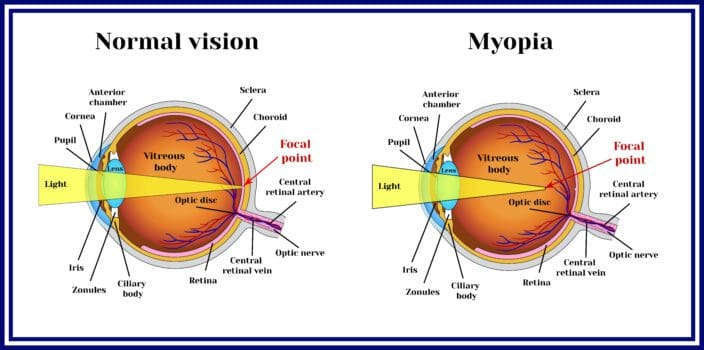Degenerative Myopia: Risk of Blindness, Prognosis & Treatment
Home / Nearsightedness (Myopia) /
Last Updated:
Myopia is often called nearsightedness, and it’s a relatively common condition that is treated with glasses, contacts, or surgery.
Degenerative myopia is a little different. This is a hereditary disorder that causes persistent nearsightedness, and in some cases, it leads to vision problems that can’t be corrected.
Table of Contents
Degenerative myopia begins with a lengthening of the eyeball, and there is no treatment for that issue. Researchers have tried multiple methods to treat the condition. While some are effective in helping children, there are no proven therapies for adults.
There are no surgical cures for degenerative myopia, but surgeons can address some of the medical problems the condition can cause. Those surgeries could help to preserve your vision.

How Is Degenerative Myopia Different?
Your eye is a complicated piece of anatomy. To see clearly, all the parts involved in that system must be functioning well.
Myopia, often called nearsightedness, is often caused by the length of your eye. While you can see things close to your eyes, distant objects seem blurry and out of focus.
You deserve clear vision. We can help.
With 135+ locations and over 2.5 million procedures performed, our board-certified eye surgeons deliver results you can trust.
Your journey to better vision starts here.
When you look at something with myopia:
- Light enters. Your eye pulls in images through the cornea, and light passes through the aqueous humor in the center of the eye.
- Images focus. The light should terminate at the back of your eye on sensitive cells that transmit images through your optic nerve.
- Blurriness results. If your eye is too long, the images come into focus in the middle of your eye, not at the back.
For many people with myopia, the problem begins in childhood, and it solidifies in early adulthood. When your body is no longer growing, your eyes retain the same shape, and your vision does not worsen.
People with degenerative myopia have eyes that keep growing a little bit each year. Prevent Blindness says about 2 percent of the population has this problem, and it’s often seen in people of Chinese, Japanese, Middle Eastern, and Jewish descent.
Your eyes are not designed to grow longer throughout your life, and in eyes with degenerative myopia, the growth is uneven. Parts of your eye, such as your sclera and your retina, can be stretched and pulled as the eye grows. In time, those structures can pull and crack.
You rely on your retina for vision. RNIB (Royal National Institute of Blind People) says degenerative myopia can affect the retina by causing:
- Parts of your retina grow very thin and stop working.
- The edges of your retina can thin and break down. The center of your retina can also break down.
- Breaks in the retina and its underlying blood supply can further steal your sight.
- New blood vessels can grow beneath your retina (known as myopic choroidal neovascularization), and they tend to be weak and leaky.
- New blood vessels can scar the center of your macula, and that can lead to a gap in your central vision.
How Is Degenerative Myopia Treated?
If you have degenerative myopia, glasses, contacts, and surgeries can be lifesavers. In the early stages of the disease, these tools can help you see clearly. But the condition is progressive, and your doctor can’t stop it from happening completely.
Myopia is caused by images that focus in the center, not in the back, of your eye. Common treatments can amend that issue. Your doctor might use:

- Glasses. The lenses are easy to pop on and take off, so they can be helpful for people who struggle with age-related vision changes. If things are blurry when held close to your face, you can slip your glasses off for a closer view.
- Contact lenses. These sit inside your eye, so they do not interfere with athletic performance, and they do not fog up in cold weather.
- Laser surgery. Your doctor reshapes the surface of the eye to account for your vision loss. This option is not always available for people with degenerative myopia, as you need a stable prescription to take advantage of this procedure.
People with degenerative myopia have a constantly changing prescription, so they may visit doctors often for new solutions. And unfortunately, according to the American Academy of Ophthalmology, there is no current therapy that can stop your eye from growing and your retina from thinning.
The American Academy of Ophthalmology further points out that researchers have tried many different therapeutic approaches in the past, including:
- Laser treatment. This therapy was once used to treat scarring and cracking in the eye. But researchers found that it wasn’t always helpful in treating patients. Sometimes, they got worse after therapy.
- Photodynamic therapy. This treatment was studied extensively, and researchers found that the benefits didn’t persist. People got better in the first year, but problems came back later.
- Anti-VEGF agents. This treatment is new. Doctors hope that it might help people with degenerative myopia, but it requires multiple injections. And researchers are not sure the benefits will last.
Researchers do say that they can offer therapies to children, in the hopes that they can slow down the progression of the disease. They encourage children from families that have the disorder to spend more time outside, as that has been known to reduce myopia risk. And they have been using strong corrections to amend vision problems in children, so they can encourage slower eye growth. Medications sometimes help in children too.
Does Surgery Help?
If you have degenerative myopia, it’s crucial for you to stay in close contact with your doctor for regular eye exams. While your doctor can’t stop your eye from growing, therapies can help to mend the damage the disorder can cause. And some of those therapies involve surgery.
For example, if your eye is invaded by blood vessels that do not belong there, your surgeon can use techniques to close those vessels and remove leaking blood, so your retina stays as healthy as possible. Similarly, if your retina thins and tears, your doctor can repair that damage so you can preserve your sight.
Experts say that surgical techniques with degenerative myopia are aimed at repairing damage, not stopping the disease process. But that shouldn’t diminish the importance of these procedures. With the help of your doctor, you can ensure that some of the most common complications of this disorder do not steal away vision you could keep.
Degenerative myopia is progressive, and that means some people with the condition do develop blindness. But others work with their doctors to manage complications, and they use conventional tools like glasses and magnifying glasses to ensure they can see and enjoy the world around them.
Talk with your doctor about the best way to manage your condition and protect your eyes. You may find that there is a path to healthy eyes ahead, with medical help.
You deserve clear vision. We can help.
With 135+ locations and over 2.5 million procedures performed, our board-certified eye surgeons deliver results you can trust.
Your journey to better vision starts here.
References
- Degenerative Myopia. (November 2015). Prevent Blindness.
- Degenerative Myopia: A Review of Its Nature and Current Treatment. (December 2011). Prevent Blindness.
- Myopia and Pathological Myopia. RNIB.
- Pathologic Myopia (Myopic Degeneration). (October 2019). American Academy of Ophthalmology.
- Diagnosis and Treatment of CNV in Myopic Macular Degeneration. (April 2015). American Academy of Ophthalmology.
- Prevention and Management of Myopia and Myopic Pathology. (February 2019). Investigative Ophthalmology and Visual Science.
- Monitor Progressive Myopia. (August 2010). Review of Optometry.
This content is for informational purposes only. It may have been reviewed by a licensed physician, but is not intended to serve as a substitute for professional medical advice. Always consult your healthcare provider with any health concerns. For more, read our Privacy Policy and Editorial Policy.
